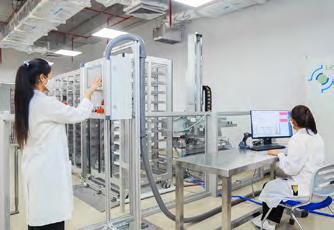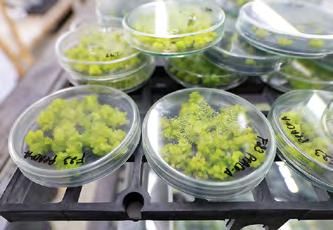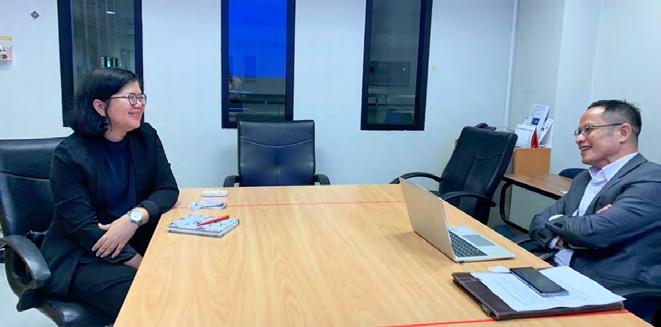
9 minute read
BIOTEC: Playing a central role in Thailand’s biotech development
Dr. Wonnop Visessanguan, Executive Director of the National Center for Genetic Engineering and Biotechnology (BIOTEC), National Science and Technology Development Agency (NSTDA)
Biotechnology in Thailand has been undergone more than three decades of development with the advantage of a well-equipped infrastructure, and many tech labs and pharma companies situated in Thailand. Bioeconomy is one of the country’s 10 targeted growth-engine industries under the “Thailand 4.0” economic model.
Advertisement
The National Center for Genetic Engineering and Biotechnology (BIOTEC) plays an important role in supporting and transferring technology for the development of industry, agriculture, natural resources, the environment and, consequently, the social and economic well-being of Thai people. It is one of four national research centres operating under the National Science and Technology Development Agency (NSTDA) which acts as a bridge between academia and industry.
UPDATE interviewed the new BIOTEC Executive Director, Dr. Wonnop Visessanguan, one of Thailand’s renowned researchers who has led BIOTEC for six months. He recently received the “Outstanding Scientist in Food Science and Technology 2020” award from the Foundation for the Promotion of Science and Technology under the Patronage of His Majesty the King.
What was the need for the establishment of BIOTEC in Thailand in 1983?
The term “biotechnology” was very new in Thailand at that time. It was started in 1982 with the International Centre for Genetic Engineering and Biotechnology (ICGEB), a project of the United Nations Industrial Development Organisation (UNIDO), which was looking for a biotech laboratory in Asia. Therefore, the Government of Thailand tendered a bid to host a UNIDO international centre for genetic engineering and biotechnology. Despite the unsuccessful attempt, the potential of biotechnology was recognised, and the National Center for Genetic Engineering and Biotechnology (NCGB) was established under Thailand’s Ministry of Science, Technology and Energy on 20 September 1983 with the objective of supporting biotechnology research in various public organisations. “NCGB” was later renamed “BIOTEC”.
To what extent has BIOTEC fulfilled the mission and commitment to support and transfer technology for the development of industry, agriculture, natural resources, the environment, and the social and economic well-being of Thai people?
The roles of BIOTEC have evolved during three decades, from building infrastructure and core competency to making policies, collaborating with business sectors and undertaking its own research. In the first decade (1983-1992), BIOTEC’s role was to establish the basic infrastructure for biotechnology in Thailand. Apart from granting projects/studies by researchers who had academic excellence, we built up a network of biotech experts and supported the development of laboratories in academic institutions such as Mahidol University and Chulalongkorn University.
Our second decade (1993-2002) focused on collaboration with several leading institutions in Thailand to achieve biotechnology excellence. We played key roles in developing Thailand’s biotechnology policy, intellectual property management, biosafety guidelines, raising public awareness as well as educating the public about biotech and its applications. People started to recognise BIOTEC when our research had impacts on them and we had our own laboratory in 1996.
Our office moved to the Thailand Science Park (TSP) in Pathum Thani in 2002, which was the first technology and innovation hub of Thailand, where we served as a one-stop service centre to assist both foreign and local companies engaged in scientific and technological research. We had our own research units there, focusing on the necessary biotechnological aspects such as genetic improvement and the first transgenic papaya resistant to ringspot virus, which was plant biotechnology collaborated with Kasetsart University. After 20 years, certain researchers who received our grants had become heads of research labs and the public started to become aware of our work once our projects had impacts on their lives.
Thus, in our third decade (2003-2013), we implemented Thailand’s National Biotechnology Policy Framework with emphasis on health-care services, modern biotechnology, education, training, biotechnology business and intellectual property rights. For example, our research team discovered the crystal structures of a primary malarial drug target, dihydrofolate reductase, providing new approaches for anti-malarial drug design. In 2011, the Chimeric dengue vaccine candidate, which was co-developed by BIOTEC, Chiang Mai University and Mahidol University was licensed to BioNet-Asia Co., Ltd. in order to further develop it into a commercial product. BIOTEC has aggressively pursued collaboration with our strategic overseas partners. We learned from our partners, adapt the knowledge to local context which served as a base for further development. New technologies and discoveries have been transferred to the private sector.
What is Thailand’s competitive advantage in the biotech industry, and which countries are our main competitors?
Thailand’s prime strength is biodiversity. We just have not utilised it to the fullest potential. We have a unique culture, while our human resources and infrastructure are getting better in quality. In the past, our researchers were proficient at the laboratory scale R&D only, but now they are equipped and capable to enhance their core competency at the transnational research. Therefore, we compete with ourselves. I don’t see other countries as our competitors, but as our alliances, as each country has its own strength and we can support each other. BIOTEC has a Human Resource Development Program in Biotechnology where scholarships were awarded to researchers from neighboring countries, especially Cambodia, Laos, Myanmar and Vietnam (CLMV), to spend up to 6 months in BIOTEC labs.
When we talk about biotechnology industry in Thailand, such as food science, agriculture and pharma, which area is dominant?
Food science, agriculture and pharma are all outstanding areas for Thailand; all are essential. Agriculture involves a massive number of people and stakeholders, but it has not gained much value-added in terms of industrial product development. Food and microorganisms could be largely enhanced as industrial products, while pharma is also one of the four requisites.
BIOTEC’s research and development (R&D) covers a wide range of topics. For plant biotechnology, we focus on rice, cassava, and oil palm. For animal biotechnology, we focus on shrimp and dairy cows, whereas food biotechnology aims to improve and upgrade the processing and quality of fermented food in areas that include food safety, food chemistry, and starter culture technology. Medical biotechnology focuses on research on tropical and emerging diseases such as malaria, tuberculosis, dengue fever and influenza. On environment, BIOTEC places an emphasis to the study of microbial diversity, and the preservation, utilisation and conservation of bioresources. We have carried out comprehensive research and focused on the use of microorganisms and natural compounds derived from microorganisms as sources for innovative medicines. We have a National Biobank of Thailand to classify and preserve various microorganisms found in Thailand.
What are the main biotechnology products made in Thailand or businesses that were originally owned by Thai companies? Do we have our “global brands”?
In the biotechnology industry, we have not had our own global brands. Biotechnology is a niche, but diverse at the same time.


Please share the outlook for the biotechnology industry in Thailand in 20212022

The government is adapting the so-called “BCG Model”, or Bio-Circular-Green Economic Model, for economic development to reach its ambitious goal of raising the country’s GDP by 1 trillion Thai Baht within the next 5 years. Products will be more bio-based, thus the production process must be improved accordingly. Microorganisms will be the key for the transition towards more sustainable modes of production and product development. Despite the current economic downturns, the importance of bio-based products will increase because they are essential. In terms of the industry’s key challenges, there are climate change, Covid-19 and technology disruption. Climate change strongly affects animal, plant and bioscience, while Covid-19 disrupts our health and day-to-day activities. Last, the technology disruption accelerates a product’s lifecycle. Many things that used to work, don’t work anymore. Talking about Covid-19, on the other hand, it actually helps to change people’s mindsets that innovation is indeed important. In the past, they thought about marketable products rather than innovation. From now on, biopharma will be therapeutic and locally-made vaccines will be necessary to enable us to be more ready to handle pandemics in the future.
For the future direction of Thailand’s biotechnology industry, what will be the focus area in the Biotechnology Development Policy Framework, 2022-2031?
In fact, BCG has replaced the Biotechnology Development Policy Framework. All plans are led by BCG, which focuses on food and agriculture; medicine and wellness; energy, material and biochemical aspects; and tourism and a creative economy. At the heart of BCG Model is BIOTEC as we spearhead the development of the country’s biotechnology sector.
What is the importance of “Biopolis” in the Eastern Economic Corridor of Innovation (EECi) to Thailand? How would German companies benefit from the Biopolis?
We will definitely focus on BCG, which is the integration of bioeconomy, circular economy and green economy as a path towards more sustainable growth. In summary, bioeconomy involves the production of renewable biological resources and the conversion of those resources into value-added products. Circular economy aims at reusing and recycling resources, while green economy keeps economy, society and the environment in balance – leading to sustainable development. Biopolis is the infrastructure in the EECi in Rayong for providing facilities for biotechnology research and services. Its objective is to support the development of Thailand’s targeted industries. Biopolis aims to be fully operational in 2022. In the first phase will focus on strategic areas such as innovative agriculture, functional ingredients, and chemical and bioprocess technology for the product development by the bio-based industry. Biopolis also provides comprehensive assistance to entrepreneurs such as prototype production, incubation, business scale-up, start-up exchange program and training. There will be state-of-the-art facilities for industrial collaboration to overcome traditional barriers between labs and commercial applications such as biorefinery pilot plants, plant factory and phenomics greenhouse. We have collaborated with the Fraunhofer Center for Chemical-Biotechnological Processes (CBP), Germany, on biorefinery and Institute for Bio- and Geosciences Plant Sciences (IBG-2), Julich on plant phenomics.
Please share with us some success stories about how the research/innovations by Thai scientists/inventors have supported the growth of Thailand’s biotechnology industry and reduced the need for know-how technology imports from overseas.
Although researchers tend to have their topics of interests, which, in some cases, are not align with market demands, there are a number of our research works which are through to commercial launch. For example, BIOTEC has collaborated with KEEEN Limited in the production of a small-scale mobile microbial reactor for on-site bioremediation in the treatment of oil-contaminated wastewater. My research on feed enzyme technology was licensed to Asia Star Animal Health Co., Ltd. for commercial production. In the past, all feed enzyme had been imported. Currently, local R&D and production can help reduce the import by 20%. BIOTEC has been collaborating with start-ups, SMEs and large enterprises in terms of R&D and human resource development. Different mechanisms to facilitate partnership with the industries have been established. These include collaborative and contract research, consultancy service and in-house and on-site training. All of which can be customized to meet specific demands from the industry.
Interview by Chadaphan Maliphan, GTCC Publications and Communications Manager










